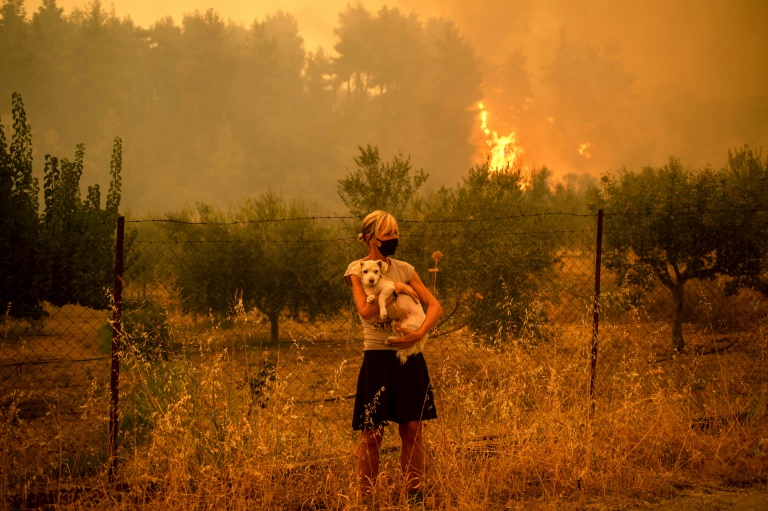With balm and bandages for scorched paws, volunteers at a makeshift animal shelter north of Athens are doing what they can for cats and dogs, whether strays or left behind as their owners fled advancing wildfires.
The volunteer vets have organised an “intensive care” area to monitor severely burnt animals under a tarpaulin in an abandoned quarry on the outskirts of the capital.
“So far we have taken in 233 animals,” Yannis Batsas, president of Action Volunteers Greek Veterinarians, told AFP.
And the animals keep coming. “We receive about 20 every day.”
The less severely affected four-legged survivors get baths every two to three hours to cool their burns.
“It’s time for a bath,” one young volunteer said as she took hold of two small puppies, easing them into a small basin of water.
– First victims –
Many in the Athens area were evacuated at the start of August as advancing wildfires ravaged pine forests and homes some 30 kilometres (19 miles) north of the capital.
Along roads lined with the charred husks of pine trees, AFP reporters met groups of volunteers collecting abandoned aminals in Efnides and other affected villages.
With strays common in the area, the animals are the first victims of the fires, the vets say, not to mention the many domesticated animals left in gardens as their owners fled.
The volunteers at the shelter do what they can to comfort the animals, circulating among cages where dogs with bandaged paws await their owners.
In a cacophony of barking, the dogs, burnt on their paws or on their bodies, joyfully welcome the volunteers whenever they approach.
Settled on sheets filled with ice cubes, about 20 of the canines are waiting for their owners to come and reclaim them or, failing that, a family to adopt them.
So far, nearly 90 animals have found their families, said Elena Dede, founder of nonprofit organisation Dogs’ Voice.
Dede said more than 2,000 people showed up to volunteer, many agreeing to take dogs home for a couple of weeks to ease pressure at the shelter.
“Instead of having 200 animals all in one place, you’ll never have more than about 50, and that’s because of the shelters and adoptions,” said Batsas.
– Outpouring of solidarity –
Dede said the group had received donations amounting to about 10 tonnes of dog and cat food.
“That will be distributed all over Attica, in areas affected by the fires and here of course,” she said.
The outpouring of solidarity in Athens is encouraging volunteers to open another centre on the island of Evia, where wildfires continued to rage on Thursday.
“A team left for Evia to go and see the farms, the goats, the sheep that were burnt,” said Batsas.
“Evia is a different story. We have to be sure that we’ll have the capacity to respond with the same efficiency that we have here,” said Dede.
Evacuating injured animals from Greece’s second largest island is complicated.
“They have to be transported by boat, which lengthens the journeys,” said Irini Tapouti, director of the Chalkida veterinary clinic on Evia.
On the beach at Pefki, where deckchairs are now covered with ash, Roula Papadimitri and her daughter Eva are bringing first aid and comfort to a dozen dogs they saved from the flames.
They were forced to abandon their house in the adjoining village of Artemisia on foot.
“There is no way I’m leaving without them,” Eva said.
“How can you abandon dogs,” asked her mother, incredulous.
Slowly, Roula poured water into the animals’ thirsty mouths. A small cat rescued from the flames weaves in and out between the trembling dogs.
Three dogs have been caged to stop them running away and endangering themselves, said Roula.
“I’m not going to let them go and be taken by a wolf.”









